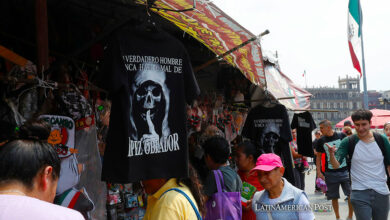U.S. Denounces Corruption in Central America, Updates Engel List
The U.S. State Department intensifies its stance against corruption and undemocratic practices in Central America, adding 14 critical officials to the Engel list, signaling a clear message of accountability.

Photo: PLBechly
Latin American Post Staff
Escucha este artículo
Leer en español: Estados Unidos denuncia corrupción en Centroamérica y actualiza Lista Engel
U.S. Expands Engel List to Target Corruption in Central America
In a decisive move to combat corruption and uphold democratic values, the U.S. State Department has expanded its Engel list, adding 14 officials from Central American countries. This list, periodically updated, identifies foreign officials believed to be complicit in undermining democracy, engaging in significant corruption, or obstructing justice investigations. The latest update has spotlighted several high-ranking figures from Nicaragua, Guatemala, El Salvador, and Honduras, underscoring the U.S. government's commitment to promoting regional transparency and accountability.
The Engel list's most recent additions include four Nicaraguans, four Guatemalans, three Salvadorans, and three Hondurans. Among them is Ricardo Salgado, the Strategic Planning Minister of Honduras, a cabinet member under President Xiomara Castro's leftist administration. The U.S. accuses Salgado of directing efforts to suppress opposition through violent intimidation, an allegation Salgado has publicly rebuffed, claiming pride in his inclusion on the list and accusing the U.S. of supporting corrupt regimes.
Morales Lazo's Politically Motivated Investigation
In Guatemala, prosecutor Leonor Eugenia Morales Lazo has been singled out for leading an investigation deemed politically motivated. According to the U.S. State Department, her actions cast doubt on certified election results and disrupted the presidential transition process. This action aligns with the U.S. and Western countries' support for President-elect Bernardo Arevalo, affirming concerns about attempts to undermine democratic processes in Guatemala, the most populous country in Central America.
The list also targets figures from El Salvador, including three officials from the country's institute for access to public information. Their inclusion is based on deliberate actions to block public access to information, a critical component of transparent governance. In Nicaragua, Judge Gloria Saavedra has been accused of misusing her judicial position to suppress dissent, particularly in the case of a Jesuit-run university's seizure, which the U.S. contends lacked legal justification.
The Purpose of the Engel List
The Engel list, named after its initiator, former U.S. Representative Eliot Engel, serves as a tool for the United States to publicly denounce and penalize foreign officials involved in anti-democratic activities or corruption. It reflects a broader strategy of the U.S. government to promote democratic ideals and combat corruption globally, especially in regions where these issues have been persistent and systemic.
Including these officials on the Engel list is not just symbolic; it carries potential consequences, such as visa restrictions and other diplomatic measures, which can significantly impact the individuals involved. It's a clear signal from Washington that it is closely monitoring governance issues in Central America and is prepared to take action against those it perceives as threats to democratic norms and the rule of law.
Timing Amid Regional Challenges
This latest update to the Engel list comes when many Central American countries grapple with internal challenges related to governance, corruption, and the rule of law. As demonstrated by the Engel list, the U.S. stance is clear that it expects higher transparency and accountability from its regional neighbors.
However, the Engel list also raises questions about the role and influence of the United States in the internal affairs of other nations. While the intent is to promote democracy and reduce corruption, it can be perceived as an external imposition of values and standards, potentially leading to diplomatic tensions. The effectiveness of such measures in bringing about real change remains a subject of debate.
Also read: US-Cuba Tensions Escalate Over Alleged Subversive Plot Claims
Including Central American officials on the Engel list reminds of the ongoing struggles against corruption and the need for robust mechanisms to uphold democratic values. It highlights the role of international pressure in prompting change but also underscores the complexities of external intervention in sovereign nations' affairs. As the U.S. continues to use tools like the Engel list to influence global governance, the balance between international accountability and respect for national sovereignty remains a delicate and ongoing negotiation.




